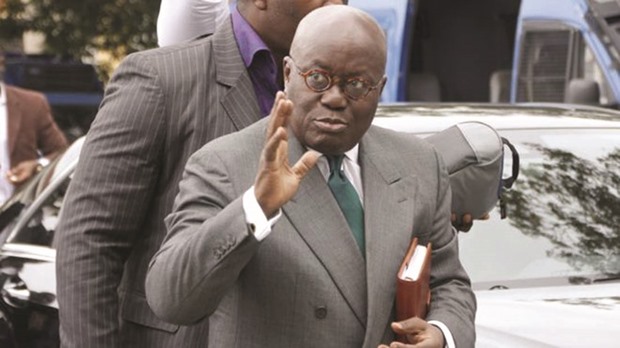Ghana’s President Nana Akufo-Addo has defended his controversial decision to appoint a 110-minister government, calling it a “necessary investment” in the small west African country.
On Wednesday Akufo-Addo named 50 deputy ministers and four ministers of state in addition to 56 ministers and deputies previously announced.
The new government – which includes dozens of lower-level and regional ministers – is a record for Ghana and has sparked a storm of commentary on social media and radio talk shows.
“I’m aware that people are concerned about what they see as maybe the cost of this large government,” Akufo-Addo admitted in an interview on national television on Friday. “It is a necessary investment to make.”
Akufo-Addo, who was elected in December on a promise to fix a host of economic problems and fight corruption, stressed that his ministers “are coming to work, it is not going to be a holiday”.
And he insisted that the costs of his new government would not be as high as people might think.
“The number, for instance, among the deputy ministers – 42 out of 50 are all parliamentarians, and in effect converting them from parliamentarians into ministers, the marginal cost of that transformation is minimal in terms of the public exchequer,” he said.
The ministers are needed for the “rapid transformation of this country”, Akufo-Addo said.
George Lawson, deputy general secretary of the opposition National Democratic Congress (NDC), told AFP that the increase in the number of ministers was “not proper” and charged that Akufo-Addo was giving out “jobs for the boys”.
“It’s a drain on the Ghanaian economy,” he added.
Akufo-Addo came to power in January after beating the NDC’s John Dramani Mahama in December’s election.
The new president says that he has inherited an economy reeling from huge fiscal deficits, rising inflation and high unemployment despite an International Monetary Fund (IMF) programme designed to stimulate growth.
The agriculture ministry now has a minister, a minister of state and three deputies, while four other ministries also have three deputies each and their ministers.
“We’re confronted with an elephant size of government and Akufo-Addo has proven that he’s a politician rather than a president,” NDC leader Haruna Iddrisu told Reuters.
Top government appointees receive monthly salaries equivalent to around $4,000 in addition to at least two cars, free fuel, a house, free utilities and personal protection, according to parliamentary sources.
“It’s a case of jobs for the boys,” politics lecturer Geoffrey Molu told Reuters.
His comment was echoed on social media and by callers to radio phone-in shows.
Ghana exports gold, cocoa and oil and had one of Africa’s most dynamic economies, but growth slowed sharply in 2014 due to a fiscal crisis and a slump in global commodities prices.
Government spokesman Nana Akomea said the criticism would cease if the government delivers on its ambitious agenda.
“For ministerial numbers to cross beyond the nineties into the hundreds will surely alarm and disappoint Ghanaians ... but Akufo-Addo believes he needs these numbers of appointees to deliver,” Akomea said on Facebook.

Akufo-Addo: It is a necessary investment to make.
